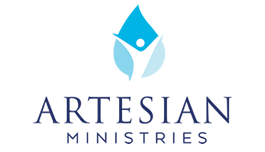Whether you are a new or seasoned Christian, knowing how to study the Bible and where to start are daunting tasks. Been there. Done that.

Technology allows us to have the Bible at our fingertips 24/7. Smartphones, tablets, and laptops enable us to access God’s Word just about anywhere in the world.
We can attend church online, listen to sermons and podcasts as we drive, or experience worship through music videos without leaving our homes.
The entire Bible is more accessible than at any other point in history, yet “How to Study the Bible” is searched online over 8,500 times each month.
Access to the Word of God is not the issue. Yet our knowledge of its contents is decreasing.
Where Do I Start?
I will say it again: knowing how to study the Bible and where to start are daunting tasks. Our spiritual growth stagnates the longer we wait. Many Christians lack practical tools to study the Bible effectively.
It takes time to incorporate a new habit, discover the best way to study, and the best study bibles to utilize on this new journey.

Why Is Knowing Scripture Important?
Studying Scripture changes our lives from the inside out. We learn how to love like God. Forgive like Jesus. And treat enemies with kindness. Counter-cultural to say the least.
Most importantly, the Bible reveals God’s beautiful truth that He sent His only Son to rescue us from sin, death, and the grave!
I first started studying Scripture after becoming a Christian at age 23. I did not know anything about the Bible. There’s an Old Testament and a New Testament? You get the gist.
I felt that my basic questions were off-putting to mature Christians. I lacked a good starting point, a good study bible, or a good direction on which steps to take first.
Over the past thirty years, God has cultivated in my daily life solid tools to study, memorize, and apply Scripture every day. I am passionate about biblical literacy.

Participating in church or small group Bible studies along with Sunday sermons is important. However, taking a personal lead in developing effective self-study methods stokes that flame of faith.
Some of these methods may work better for you than others. Invest some time trying each one to discover which works best for your personality and schedule.
First Things First: Start with Prayer
Scripture is God’s breath exhaled onto the page. Focusing your mind and thoughts on Him comes first and foremost. Always begin your study time with prayer.
Perhaps, one similar to this one:
Dear Lord, as I open my Bible today, open my heart to hear your words of truth. I pray that your Word comes alive in me. Remove all distractions right now. Open my mind to gain understanding as your words heal, teach, inspire, convict, and restore my heart. Enable your words to take root, grow and blossom in my life. Bring your light of understanding and peace that passes all understanding. In Jesus’ name, Amen.
Method #1: Study One Book of the Bible
I suggest starting with a small book from the New Testament. The books of James, 1 Peter, and 1 John are all good choices for first-time studies.
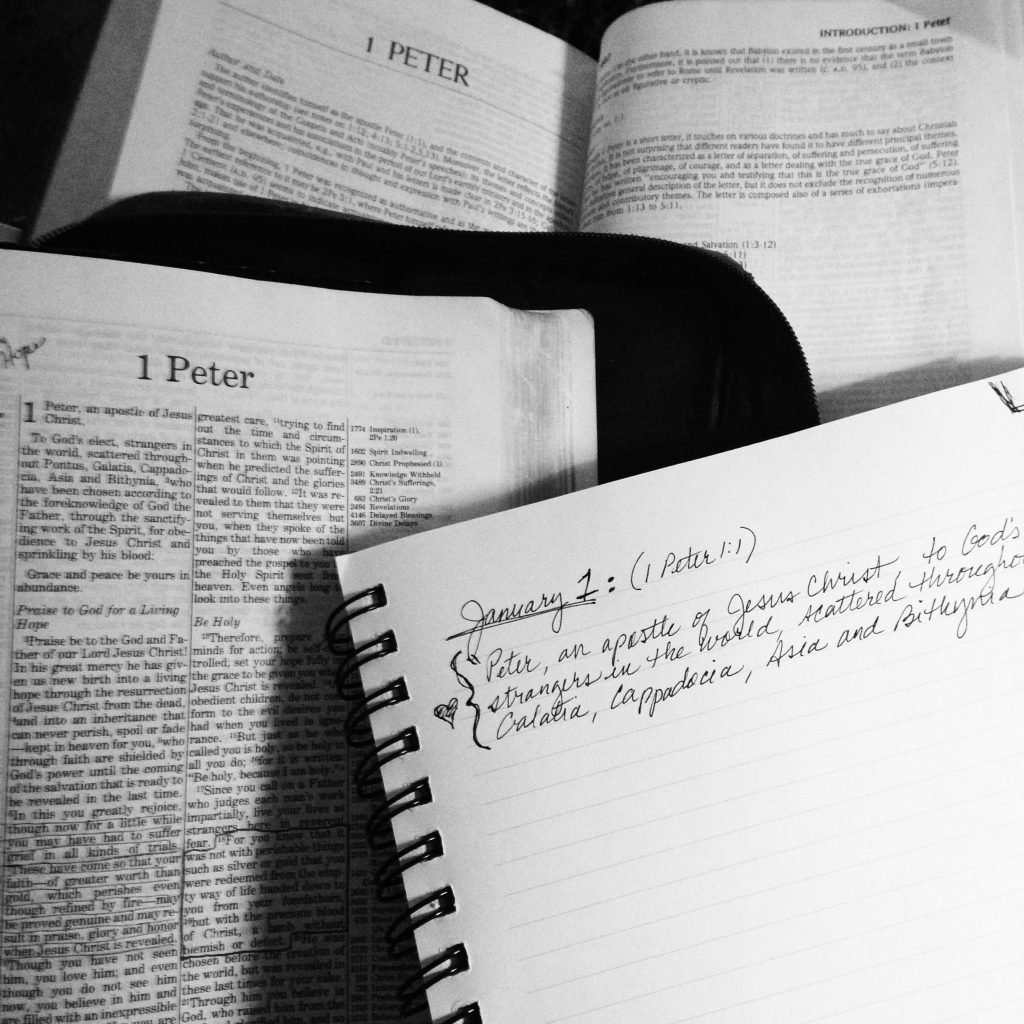
Depending on your schedule, plan to spend 3-4 weeks studying the book you have chosen. Take time to read through the entire book more than once.
Look for themes that may be woven throughout the chapters. For example, the book of James contains an obvious theme of persevering through hard circumstances. Write down the verses around each theme.
Also, make a note of life application principles within the book. In James, a clear life application is that words need to result in action. Saying that we forgive is vastly different from moving toward forgiveness.
As you meditate on the themes and life application principles, allow God’s Word to speak to you personally. Where can those themes or applications apply to your life right now?
Method #2: Read Straight Through the Bible
Reading the Bible straight through (without taking notes) allows us to “hear” it like Israel’s nomadic tribes. Individuals did not have parchment, so the Bible stories were shared verbally.
Note that you do NOT have to start at the beginning of the Bible. The Bible contains 66 separate books compiled into one. You can start anywhere you like, just use a checklist to ensure you read through all 66.
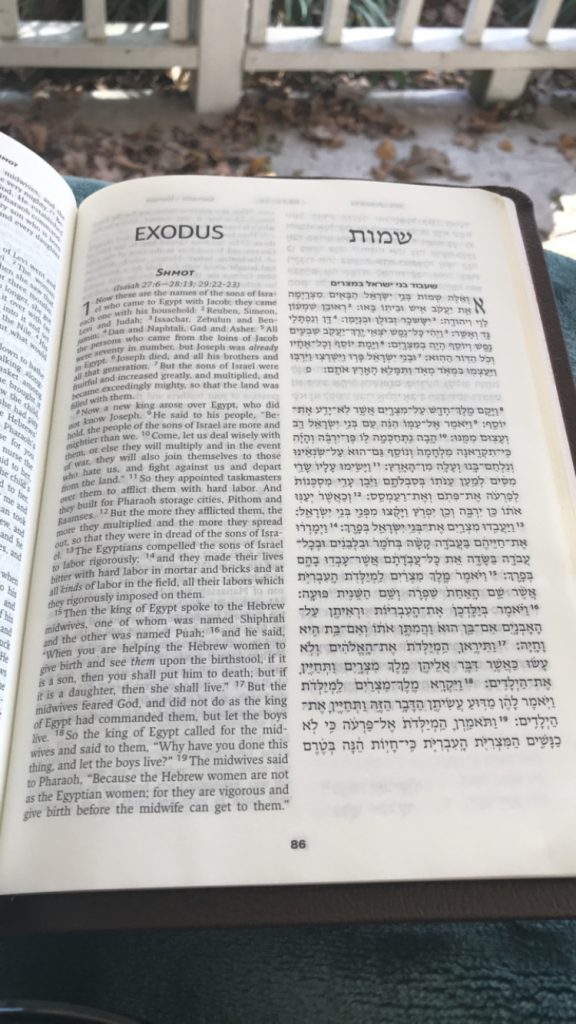
Also, choose a Bible version that is easy to read. Let’s face it, if you don’t understand it, you won’t get far.
There are dozens of translations and different versions of God’s Word, but the King James version is probably the most difficult. For clear reading, I suggest the English Standard Version (ESV), New Living Translation (NLT), or The Message versions.
As you settle down for uninterrupted reading, imagine story time around an evening campfire. Or story time in the afternoon with milk and cookies. (That’s a flashback to elementary school.)
This method allows us to see and hear the overarching story of God’s love and goodness to His children from Genesis to Revelation. His passionate, relentless pursuit of us toward salvation comes across with beautiful clarity.
I have many different Bible reading plans and checklists as free downloads here.
Method #3: Write Out Parts of the Bible
Our culture moves at lightning speed. Since we are technologically driven (for the most part), we desire things to move fast – such as food, lines, and traffic.
Absorbing Scripture into the marrow of our bones takes time. Breathing space. Quiet surroundings. That’s where grabbing a pen, your Bible and a journal plays a vital role.
The rhythm of physically writing slows us down to absorb the words. Words have a chance to stick with us past the moment – especially if you want to memorize particular verses.
As an author, I love the steady cadence of writing out God’s Word. That cadence resounds in my soul to retain those life-giving words. I recently started once again with the book of Matthew.
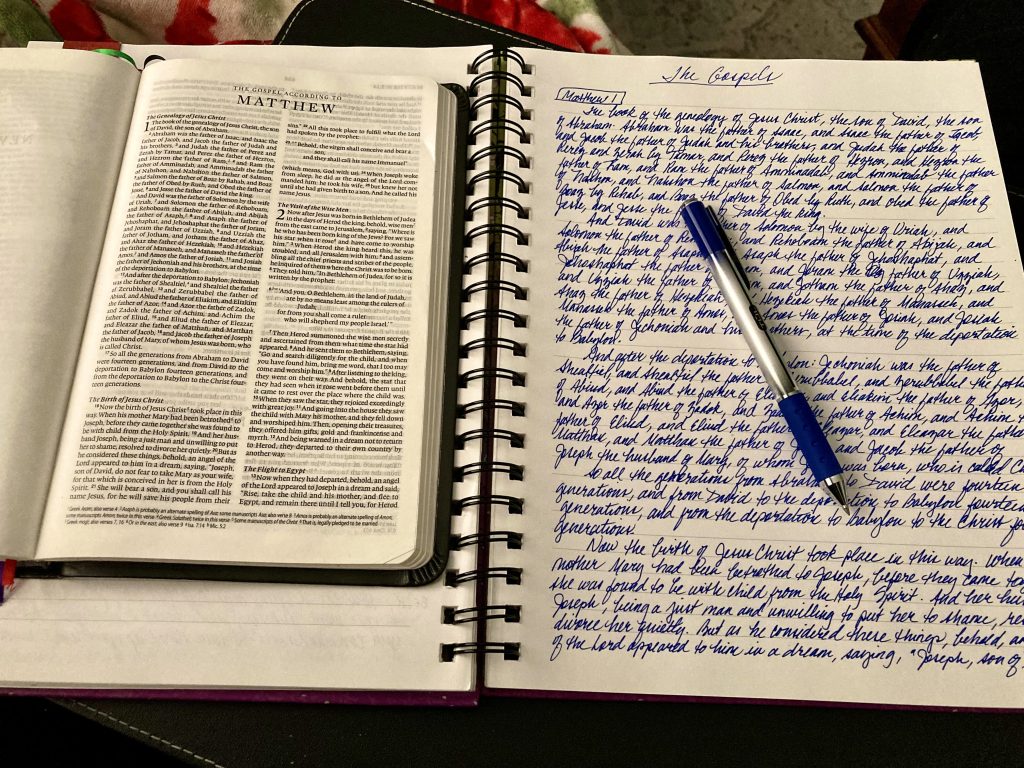
Make writing fun! I use my favorite Tul pens and a variety of colorful journals that are readily available and inexpensive.
Method #4: Character Study
One of the most frequently asked questions is, “Who’s who in the Bible?” The follow-up question is usually, “Why do they matter?”
I love reading current biographies of historical great men and women because they lend insight into the person. Doing character studies throughout Scripture accomplishes much the same with an added bonus: we glimpse the character of Christ.
For instance, Scripture contains only two books named after women: Ruth and Esther. My quest to understand Esther using this method turned into a full-blown, published Bible study. Talk about an amazing woman of faith that God used mightily! We can learn invaluable life lessons from Esther.

Studying characters matters because their examples teach us how to actually live a life of faith:
- Moses steadfastly led the Israelites through the desert for forty years.
- Joseph never complained about being thrown into prison after refusing Potiphar’s wife.
- Mary did not doubt when God told her that she would be the virgin mother of our Savior.
Character studies allow us to see how God moved in their life. How He provided for their needs, disciplined them toward success, and loved them beyond measure. He still does that today with you and me.
Pick one person and get started! You will be amazed at how relevant their experiences still are today.
Method #5: Topical Bible Study
This method is similar to the Character Study method listed above. However, instead of a person, pick a topic. Temptation, peace, addiction, and forgiveness are a few that could be tackled.
I remember as a new Christian being confused by what it meant to be “quenched” or “hydrated” by the Lord. What does “living water” mean? Years later, I used this topical Bible study method and turned that personal quest into another full-blown Bible study.

What topic do you long to know more about how God instructs His children? Use the concordance in the back of your Bible to find where that topic appears in Scripture. Then grab a notepad.
Read and/or write down all of those passages. What does God teach about that topic? Are common misconceptions debunked? Most importantly, meditate on how God can apply those truths to your spiritual journey.
Method #6: Memorize Scripture
Hiding God’s Word in our hearts is vital. When the enemy knocks us to the ground, God brings relevant verses to mind to comfort us and bring His peace. Scripture memorization is a crucial line of defense.
One of the first portions of Scripture I memorized was the Armor of God from Ephesians 6:10-18. The evil in this world is evident – just turn on the evening news. As His children, we need to know God has protected us from head to toe.
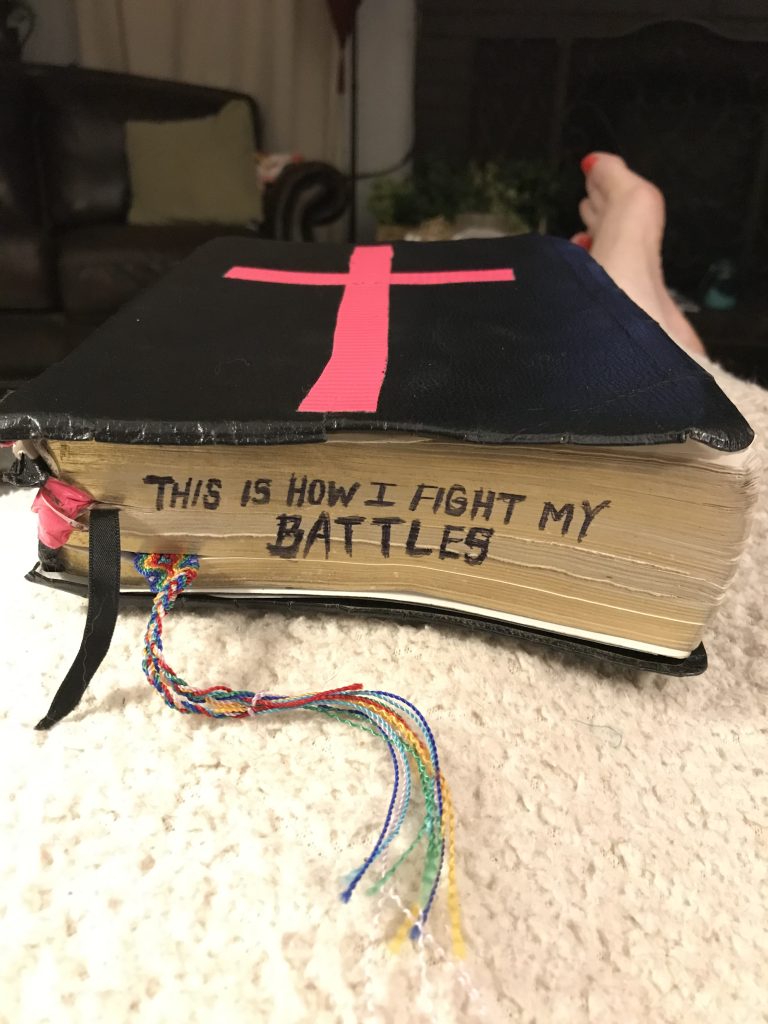
If you are facing a particular battle right now start with verses that speak to that situation. If you are experiencing joyful circumstances, start with passages that praise God. I wrote an entire Bible study on the armor of God because it is that important.
Yes, all of Scripture is worthy of memorizing. However, focusing on ones that directly apply to your current situation will be more meaningful. Memorization and real-time application will come easier.
Method #7: Bible Journaling (the SOAP Method)
A vital step in our faith journey is applying Scripture to our lives. A popular, helpful method appeared a few years ago called “S.O.A.P.” It stands for Scripture, Observation, Application, and Prayer.
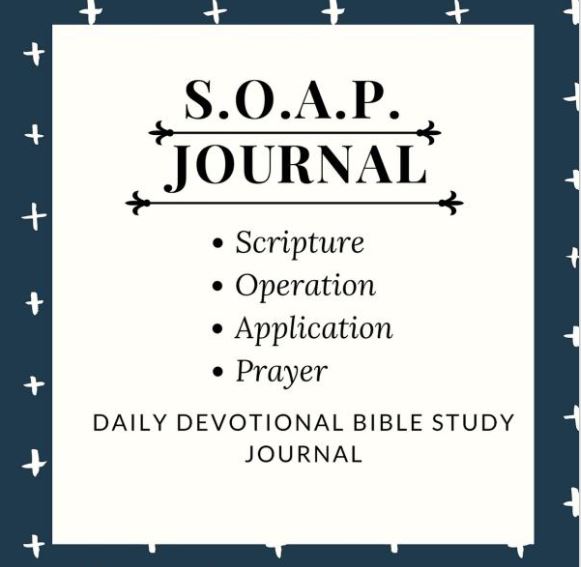
I used this method effectively when writing The God of All Comfort based on 2 Corinthians 1:3-7. Paul teaches how God comforts us in our affliction, which enables us to also offer His compassionate comfort to others.
The S.O.A.P. method is simple. Pick a section of Scripture each morning or evening during your devotion time. Using a notepad or SOAP journal:
- Write down the Scripture passage.
- Read through it again and record your Observations.
- Jot down how you can Apply those truths in your life.
- Close with Prayer asking God to make that verse personal to you.
When you come across your S.O.A.P. journals later in life and read through them, you will be amazed and encouraged by God’s faithfulness along your journey.
Method #8: Single Word Study
Have you ever wondered what the Bible says about fear? Love? Humility? Kindness? Such wondering offers a perfect opportunity to undertake a single-word study.
When I experienced divorce over a decade ago, I did not feel very loved (to say the least). One of my pastors challenged me to read through the Bible and write out every passage that talked about God’s love. WOW!
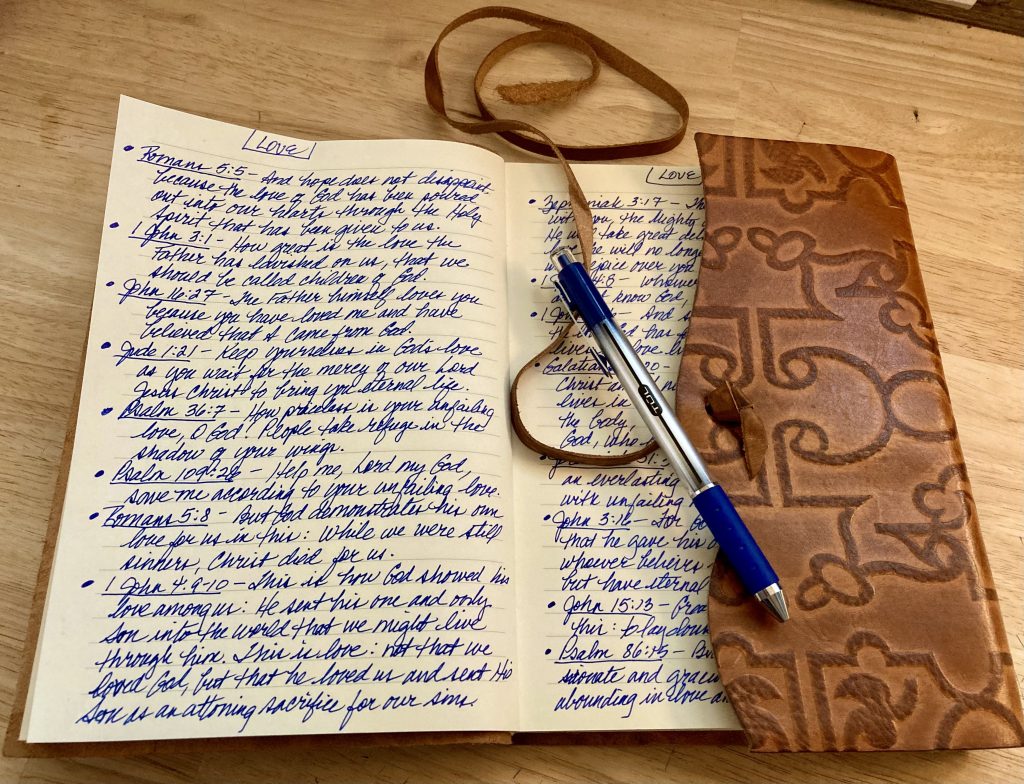
That undertaking left me without a trace of doubt about how much God loves me, even when people may not. Writing all of those love passages consumed an entire journal. If I am ever feeling unloved, I still pull out that journal. I don’t feel unloved for long.
If you desire to be more kind, I challenge you to search for every instance in Scripture where God talks about kindness. Write them out in a journal. Ask the Lord to enable you to be more kind.
God will blow you away as He works through this discipline.
Method #9: Coloring Scripture (Bible Marginalia)
Bible marginalia appeared on the scene a few years ago and has exploded in popularity. If you are an artistic person, this method is a great tool.
The premise is to meditate on a Bible verse as you highlight, color, and create art around it.
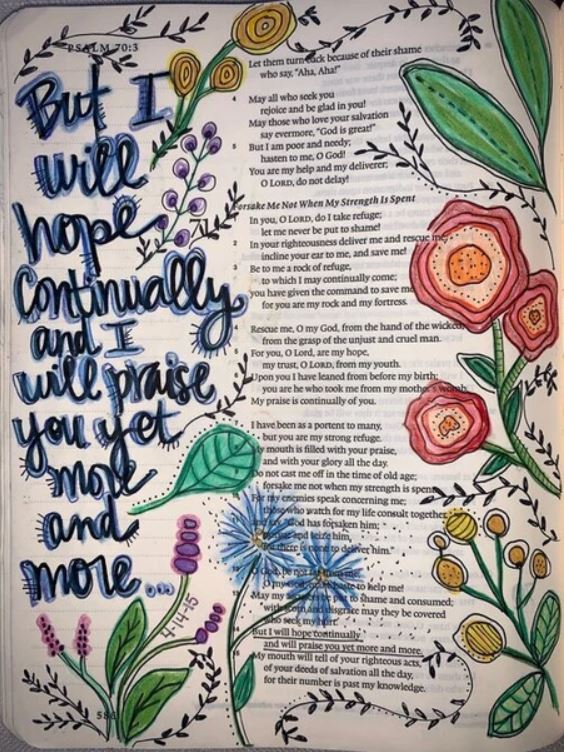
Friends of mine have a hugely popular Visual Faith® Ministry. There are hundreds of free graphics and ideas (where I downloaded the one above) that include examples of how to highlight, color, and visually enhance your Bible reading experience.
The Bible is God’s inspired Word – a TEXT full of grace and love to you. Think of the margins as your invitation to text back your response of love, gratitude, praise, or devotion. Adding a date to your pages creates a story of your spiritual journey – and leaves behind a legacy of faith for your children and grandchildren.
Visual Faith® Ministry
The goal is to utilize your God-given artistic gifts to engage with and meditate on Scripture. Be sure to keep in mind the main purpose: meditate on that passage(s) as you use your artistic talents.
Method #10: Read Scripture Like a Novel
Right from Genesis 1, Scripture opens as an epic, cosmic tale about the heavens and the earth. We see God creating everything out of nothing. We see marital drama between Adam and Eve. Blessings and curses. Covenants. Promises. Murder. Adultery. Betrayal. War. Political subversion. Even cinematic-worthy battles.
If you are a writer or wannabe screenwriter, simply look at the account of David’s battle with Goliath in 1 Samuel 17. You can’t make that stuff up. It flat out reads like an award-winning novel.
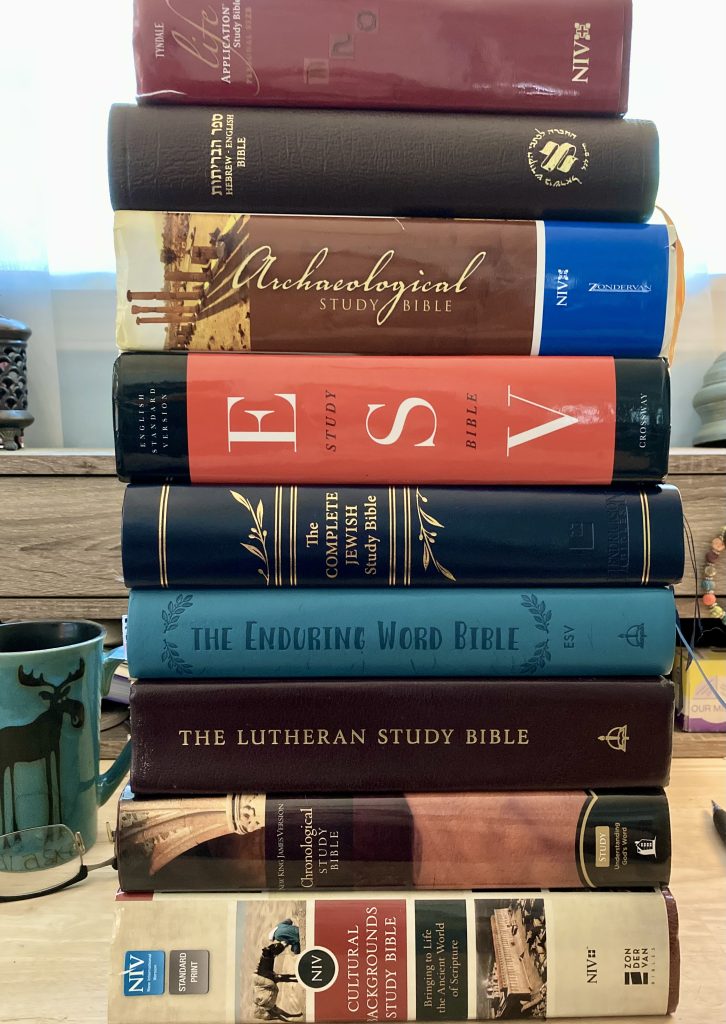
There are main characters, metanarrative, and deep plot development that become clearer when reading the Bible like a novel. The settings are both intimate and dramatic. The important difference? Scripture is non-fiction.
The overarching message of the Bible becomes crystal clear: God’s love towards us never fails.
If you love stories, read through the Bible like a novel. Mentally insert yourself into those stories. Visualize your surroundings. See how God challenges and rescues. Scripture comes alive!
Method #11: Pray Through the Psalms
As a new 20-something Christian struggling with how God could love someone like me, a godly mentor pointed me to the Psalms.
The Psalms put into words the hurricane of thoughts whirling in my head that I could not verbalize. She suggested that I use the Psalms as a prayer guideline.
It was a spiritual game-changer.
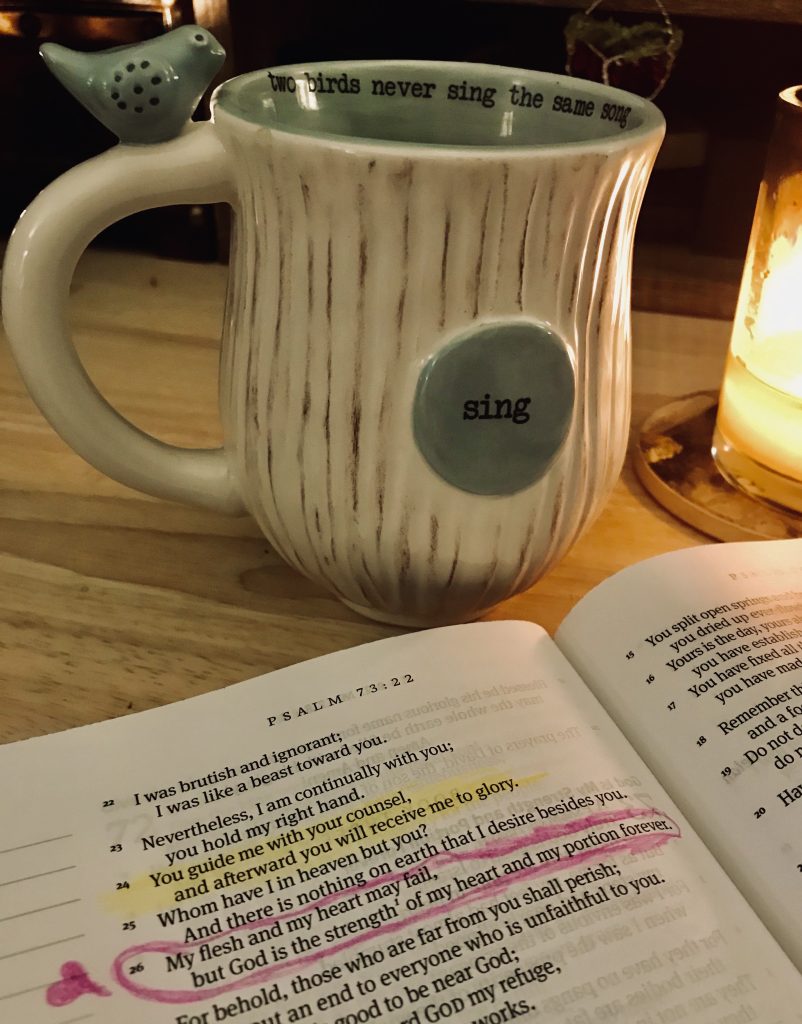
Every emotion that we experience can be found in the Psalms. Anger. Love. Bitterness. Praise. Confusion. Hurt. Thanksgiving. You name it, and it’s in the Psalms.
This method can be written out in a prayer journal, as well as spoken aloud. Since prayer is spoken aloud, start by reading the psalm aloud. You will hear the emotion of each psalmist.
Why do emotions matter?
God created us with emotion to move our hearts and soul beyond our comfort zones. What emotions are in the psalm? The key to relating to the Psalms is putting yourself in the place of the psalmist. Speak as if you were writing it from your own experience. Joy. Heartbreak. Victory. Loss.
King David penned almost half of the psalms. He poured his heart out to God in his writing. And as he wrote, God’s peace and comfort faithfully surrounded him. And his writing reflected it.
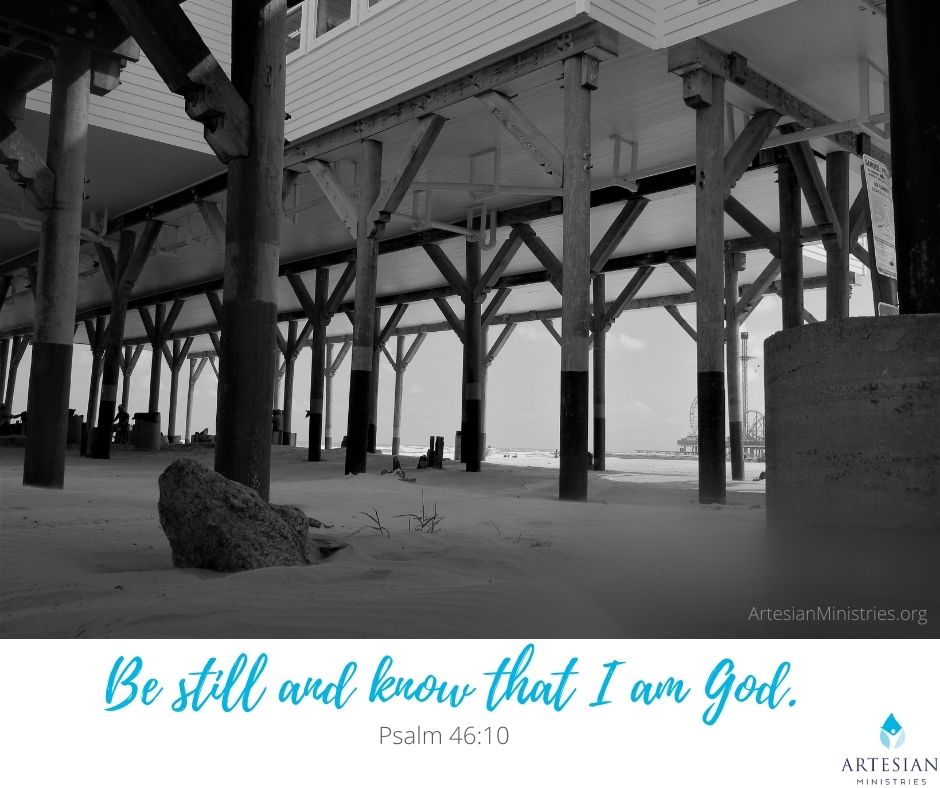
As you pray the Psalms aloud, God’s peace and comfort also surround your everyday life. We are verbally handing over our worries and concerns to the only One who has the power to change them.
The Psalms are also infused with worship. Worship was an integral part of the Israelite’s life. Consequently, the Psalms overflow with adoration and worship of God. If your circumstances leave you without words to worship, speak those worship Psalms aloud.
Praying and worshiping through the Psalms continues to be one of the most powerful spiritual tools that God has given us.
Method #12: Pull Out Your Biblical Maps
Understanding the geography around Biblical stories adds an important layer to studying Scripture. Years ago, a friend gave me an ESV Bible Atlas as a birthday gift and it is never far from reach.
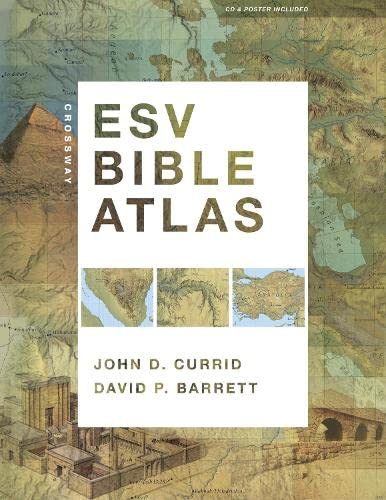
For example, when Jacob sent his favorite son Joseph to check on his shepherding brothers, a map reveals that Joseph’s journey was between 50-60 miles. Not just up the road! Such insights lend a greater understanding of the hardships and blessings of Biblical characters.
When you realize that the Sea of Galilee is only eight miles wide by twelve miles long, we can visualize how the crowds tracked Jesus’ boat as they followed Him along the shore to experience the miraculous feeding of the five thousand (Matthew 14:13-21).
I regularly lead tours through the Holy Land. One comment repeatedly stated is that they had no idea the close proximity of some locations to others. For instance, Magdala, Tiberius, Capernaum, and the Mount of Beatitudes can be seen from an anchored boat on the Sea of Galilee.

If you love maps, this is a very effective method of diving deeper into Scripture. Grab a Bible atlas, pick a story from Scripture, and track the character’s movements. This is particularly eye-opening in Exodus.
I have spent many hours lost in the pages of that Bible atlas seeing Scripture come to life through geography.
Method #13: Use Bible Flash Cards
Flashcards are not just for school students. As a bona fide lifelong learner, flashcards are an invaluable way to study Scripture.
When my Forgiveness Bible study was released, the publisher had the brilliant idea of offering Scripture memory cards as a companion study tool. I still keep those cards close as a reminder to keep a short account of hurts. Life is short. Forgiveness is commanded.
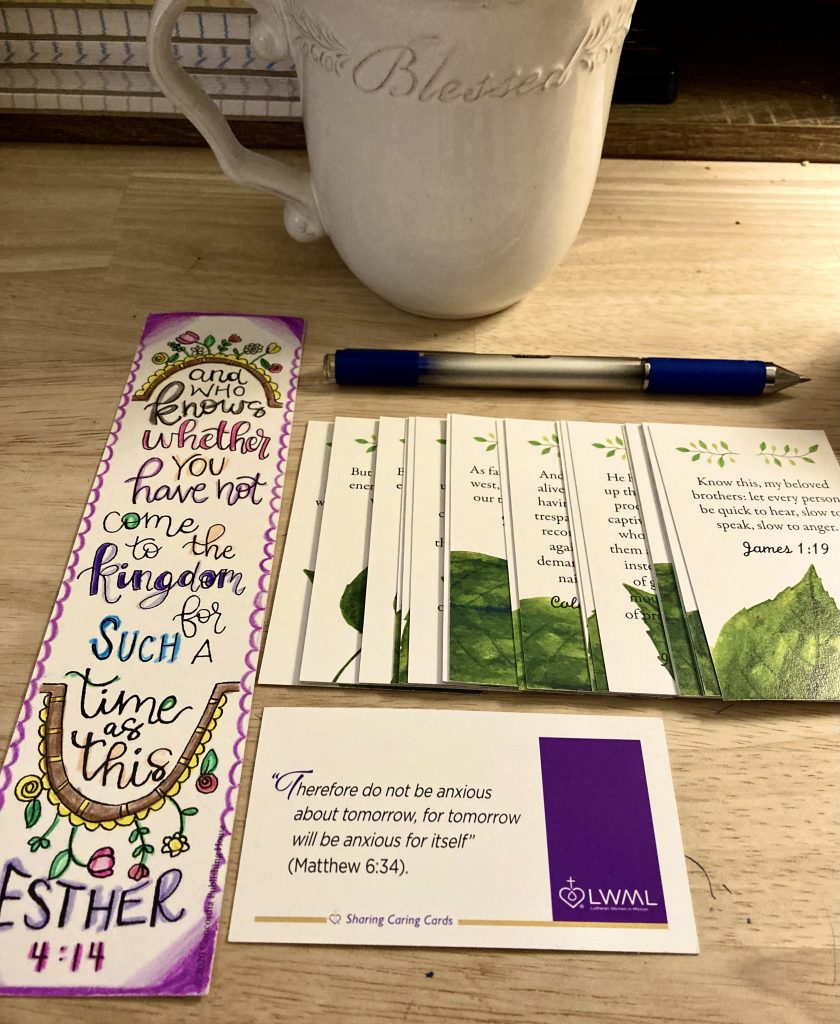
If you are new to the Bible in general, there are flashcards for learning the books of the Bible, significant characters, and even timelines.
This study method is a great resource if you do not have much daily time for in-depth study.
The Bottom Line
The Bible is our only true source of wisdom and knowledge. Regular studying of God’s Word provides a firm foundation to grow and strengthen your faith.
Remember to give yourself some grace as you study Scripture. You are learning the spiritual riches of a personal relationship with the Creator of the universe. It takes a lifetime.
The Bible is a life manual for all Christians. God’s Word is life-giving and life-changing. There is a reason that it is the world’s best-selling book of all time.
Above all, diligent Bible study will remind you time and again of the assurance of salvation through Jesus Christ alone. God bless your study time!
Related Posts:
- Best Bible Reading Plans
- Warriors in the Bible: 13 Essential Life Lessons to Learn
- 50 Motivational Bible Verses About Aging Gracefully
About the Author
Although Donna is a sought-after Bible teacher, her path from being unchurched to become passionate about sharing Jesus was not easy. Go here to read her God-breathed journey, “From Unchurched to Becoming a Multi-Published Author and Sought-After Speaker.” If you want to send Donna a quick message, then visit her contact page here.
{Some of these links are affiliate links. This means if you make a purchase through that link, the ministry may receive a small commission at no extra cost to you. Thank you for your ministry support!}
